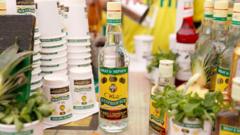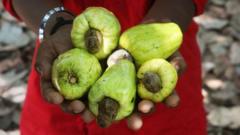As producers aim to define what constitutes "Jamaican rum," the outcome could reshape the identity and economy of this key cultural export.
**Jamaican Rum Dispute: Defining Authenticity in a Global Market**

**Jamaican Rum Dispute: Defining Authenticity in a Global Market**
In the heart of Jamaica, a heated debate unfolds over the designation of local rum, scrutinizing the authenticity amidst international business pressures.
Rum is an integral part of Jamaica's heritage, but what truly defines a Jamaican rum? This pivotal question is at the center of an ongoing dispute that has stirred the Caribbean island, as local producers are pushing to enforce stricter regulations regarding the labeling of "Jamaican rum." Last October, the Jamaica Intellectual Property Office (JIPO) approved significant amendments to the geographical indication (GI) classification for Jamaica Rum, which had initially been established in 2016. One of the crucial changes is the prohibition of aging rum outside of Jamaica.
This amendment was prompted by the Spirits Pool Association (SPA), a trade body representing the six major rum distilleries on the island, including renowned names such as Appleton and Hampden Estate. The SPA contends that a more robust GI is essential for the appellation to gain formal recognition in vital export markets like the EU and the US. They argue that this would offer enhanced protection against competitors and elevate recognition of Jamaican rum as a premium product crafted to high standards within a specific geographic context.
However, the amendment has sparked controversy, particularly among some producers, such as National Rums of Jamaica (NRJ), which controls major distilleries including Long Pond and Clarendon. NRJ, whose stakeholders include the Jamaican government and key international distilleries, asserts that exporting and aging rum abroad has been a long-standing practice. Since its acquisition by Maison Ferrand, a French spirits company, NRJ argues that this new regulation could jeopardize its business model.
A hearing regarding NRJ's appeal against the JIPO ruling is slated for April 28. The SPA contends that the issues arose only after Maison Ferrand acquired Wird, emphasizing that aging rum in Jamaica is crucial for preserving its authenticity and uniqueness. They express concern that crafting rum abroad compromises the local economy and the "rum tourism" revenue Jamaica could generate.
Geographical indications not only enhance a product's market value but also prevent it from becoming generic, as seen in successful global examples like Scotch whisky and champagne. Dev Gangjee, a professor of intellectual property law, notes that GI products often command a premium price due to their association with specific locales, thus supporting local economies.
In the broader context of the Caribbean, Barbados faces similar challenges regarding its rum GI initiative, with conflicts arising over the stipulation against overseas aging. With rum being a major economic driver for both islands, clarity on these regulations is vital.
Back in Jamaica, the SPA is eager for the country to seek EU Protected Geographical Indication status, pending the resolution of the JIPO proceedings. There is hope for a compromise that satisfies both parties involved in the industry. Ultimately, beyond economic factors, the debate underlines a deep-rooted pride linked to a product entwined with Jamaica's history and cultural identity. The Gleaner, a prominent local newspaper, recently echoed the sentiment that ownership of uniquely Jamaican products should involve a committed effort to uphold the brand’s integrity against foreign influence.
This amendment was prompted by the Spirits Pool Association (SPA), a trade body representing the six major rum distilleries on the island, including renowned names such as Appleton and Hampden Estate. The SPA contends that a more robust GI is essential for the appellation to gain formal recognition in vital export markets like the EU and the US. They argue that this would offer enhanced protection against competitors and elevate recognition of Jamaican rum as a premium product crafted to high standards within a specific geographic context.
However, the amendment has sparked controversy, particularly among some producers, such as National Rums of Jamaica (NRJ), which controls major distilleries including Long Pond and Clarendon. NRJ, whose stakeholders include the Jamaican government and key international distilleries, asserts that exporting and aging rum abroad has been a long-standing practice. Since its acquisition by Maison Ferrand, a French spirits company, NRJ argues that this new regulation could jeopardize its business model.
A hearing regarding NRJ's appeal against the JIPO ruling is slated for April 28. The SPA contends that the issues arose only after Maison Ferrand acquired Wird, emphasizing that aging rum in Jamaica is crucial for preserving its authenticity and uniqueness. They express concern that crafting rum abroad compromises the local economy and the "rum tourism" revenue Jamaica could generate.
Geographical indications not only enhance a product's market value but also prevent it from becoming generic, as seen in successful global examples like Scotch whisky and champagne. Dev Gangjee, a professor of intellectual property law, notes that GI products often command a premium price due to their association with specific locales, thus supporting local economies.
In the broader context of the Caribbean, Barbados faces similar challenges regarding its rum GI initiative, with conflicts arising over the stipulation against overseas aging. With rum being a major economic driver for both islands, clarity on these regulations is vital.
Back in Jamaica, the SPA is eager for the country to seek EU Protected Geographical Indication status, pending the resolution of the JIPO proceedings. There is hope for a compromise that satisfies both parties involved in the industry. Ultimately, beyond economic factors, the debate underlines a deep-rooted pride linked to a product entwined with Jamaica's history and cultural identity. The Gleaner, a prominent local newspaper, recently echoed the sentiment that ownership of uniquely Jamaican products should involve a committed effort to uphold the brand’s integrity against foreign influence.














